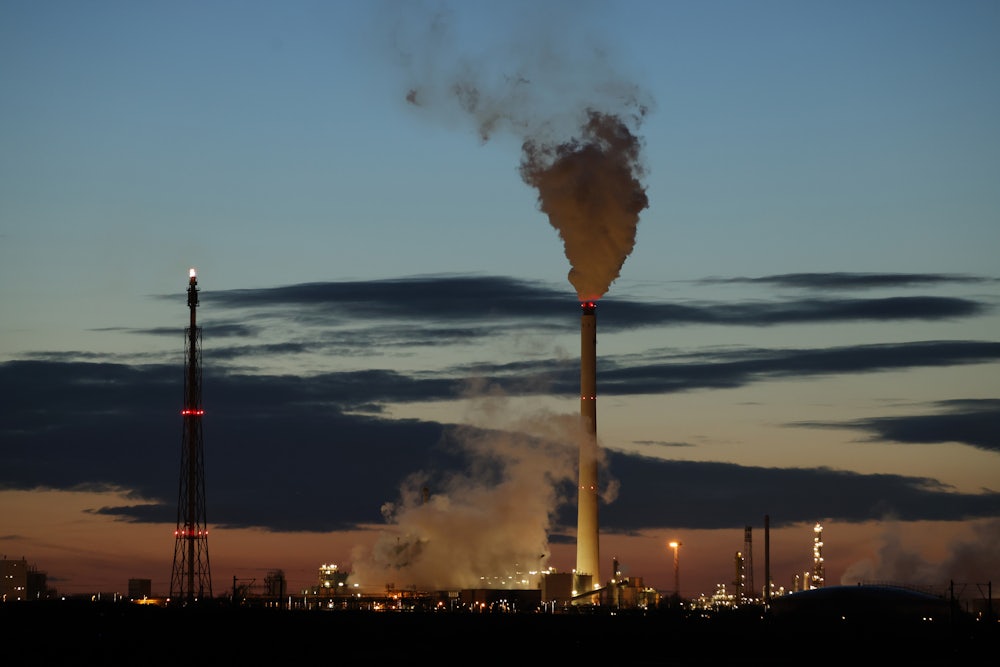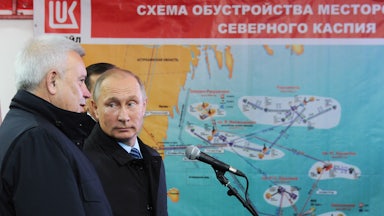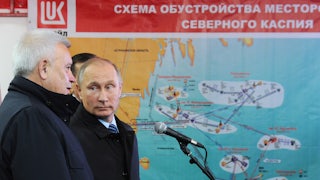In the days after Russia invaded Ukraine, multinational oil companies were heralded as brave soldiers in the fight for liberal democracy. Their decision to sell more liquified natural gas to Europe was praised as a twenty-first-century equivalent of the Berlin airdrop in the lead-up to the invasion. To comply with Western sanctions after it happened, Shell—in line with other big U.S. and European drillers—announced it would “withdraw from its involvement in all Russian hydrocarbons.” That move, the company reported, would cost $5 billion.
Nearly a year later, Shell has reported record profits and still appears to be handling Russian hydrocarbons. While the company noted last March that it would adjust its “crude oil supply chain to remove Russian volumes,” the nonprofit watchdog group Global Witness has found it very likely that Shell is continuing to import Russian oil into Europe via Turkish refineries, which have dramatically increased their purchases of Russian fuel over the last year. Turkey imported 50 percent more Russian oil in 2022 than in the year prior. Since December 5, Shell has imported 600,000 barrels of refined products from Turkey to the Netherlands. This doesn’t mean Shell is defying sanctions so much as exploiting the sort of loophole that for-profit companies can be reasonably expected to.
How such firms have behaved over the last year might offer several lessons in how they’ll respond to the climate crisis. First off, big companies probably won’t respond to the climate crisis at all unless someone makes them. But secondly, enforcing sweeping changes like sanctions or decarbonization will depend on widespread intergovernmental cooperation—something Western governments have not managed to mobilize against Russia.
Western-based fossil fuel companies represent low-hanging fruit from a sanctions perspective. Most, that is, are subject to the laws of the governments enacting these sanctions and do sizable business within them. Many companies, therefore, went a step further to engage in so-called “self-sanctioning,” not out of some solidaristic compunction but fear that they might end up with lots of stuff they can’t sell.
If fossil fuel company divestments from Russia were mistaken for something other than a business calculation, it’s because fossil fuel companies wanted them to be. Shell, for example, denounced Russian “atrocities.” Exxon expressed its support for “the people of Ukraine as they seek to defend their freedom and determine their own future as a nation.” By and large, though, companies did the bare minimum required by law and shareholders, who made out fabulously as their companies sold unsanctioned fuels for higher prices. Some firms found workarounds like buying from Turkish refineries or importing to Bulgaria, which is exempt from EU sanctions until 2024. None of this constituted much of a sacrifice: Exxon, BP, and Shell all reported record earnings last year.
The upshot for decarbonization is fairly straightforward. Corporations will do what they need to do not to break the law, find loopholes around it where possible, and look to maximize profits at every turn. They do not have moral commitments to either the people of Ukraine or the carbon content of the atmosphere; they can either be forced by law to do things that are unprofitable or will keep doing them.
The bigger picture is more complicated: While the consensus opinion in Western capitals has held up sanctions as a moral obligation, a number of governments in Africa, Latin America, and Asia have opted out of them. Rich countries’ handling of the pandemic and global debt crises over the last several years have not endeared them to leaders in the global south—or made them willing to forgo important revenues and commodities because of a war in Europe. Though 141 of 193 U.N. member nations voted to condemn Russia’s aggression against Ukraine last year—with 35 abstentions and 5 no votes—participation in sanctions has been much spottier. Two-thirds of the world’s population live in countries whose governments are either neutral on or opposed to sanctions on Russia. Businesses outside of the West, including state-owned energy companies, also see plenty to gain from filling in markets their competitors have left behind.
Since the EU adopted its embargo and price cap on Russian crude oil in early December, Russian crude sales have dropped by only around 5 percent as compared to the same period last year. Shipments of Russian crude oil to China reached record levels last month. Between the start of December and February, India imported 1.4 million barrels per day (b/d) on average; before the war in Ukraine broke out that average was just 50,000 b/d. And companies domiciled in Dubai and Hong Kong, for instance—some of them formed over the last year—have begun trading the Rosneft and Gazprom hauls abandoned by the likes of Shell and Exxon. A similar story holds for sanctions more broadly: While JPMorgan initially predicted that the Russian economy would contract by 12.2 percent under their weight, Russia’s GDP has shrunk by just 2.2 percent. The International Monetary Fund, or IMF, is now forecasting that Russia will grow faster than the UK this year and next.
Unity in the U.S. and Europe, that is, only goes so far. Even governments that oppose Russian aggression have seen little incentive to join in sanctions, particularly if that means further endangering economies already battered by the pandemic, rising commodity prices, and a strong dollar now making debts harder to pay back. While Argentina voted to condemn Russia last year, foreign minister Santiago Cafiero has said his country “does not consider” sanctions “a mechanism to generate peace and harmony, or generate a frank dialogue table that serves to save lives.”
Even the patchy level of buy-in on sanctions is proving elusive when it comes to the climate crisis. The places where decarbonization should theoretically be easiest—wealthy, diversified economies where policymakers share some commitment to cutting emissions—are still only limping toward it. Climate-vulnerable countries that derive massive revenues from coal, oil, and gas will likely be loath to give them up if reserves can still be used to pay down debts, fund development, or even recover from climate-fueled disasters. Fuel importers also see cheap power as essential for raising living standards. Moreover, why would poor countries give up fossil fuels when millionaire shareholders at Exxon and BP are raking in record payouts from them?
Even financing for renewables isn’t uncontroversial. Just this week a note from the G11 group of developing nations—signed by Brazil, Pakistan, Indonesia, and some two dozen African countries—cautioned the World Bank against doing anything that might jeopardize the Bank’s triple-A credit rating. They urged its leadership to stay “focused on the purpose for which they were established,” a sentiment seen in part as a response to the White House’s intention to appoint a president who will make climate change a top priority. The Financial Times reported fears that World Bank financing mitigation and adaptation might come at the cost of economic development funds.
Consensus, in short, is hard to come by. When it comes to the war in Ukraine, even companies within the blocs committed to sanctions on Russia are finding ways around it, while the effect of those sanctions has been muted by the relatively low levels of participation worldwide. When it comes to the climate crisis, the loosely overlapping list of countries best positioned to rapidly decarbonize is making only very slow progress toward that goal. Without presenting some tangible alternative to fossil-fueled development, they might be hard-pressed to enlist more nations in the decarbonization fight—particularly when they’ve shown such half-hearted interest in it themselves.










